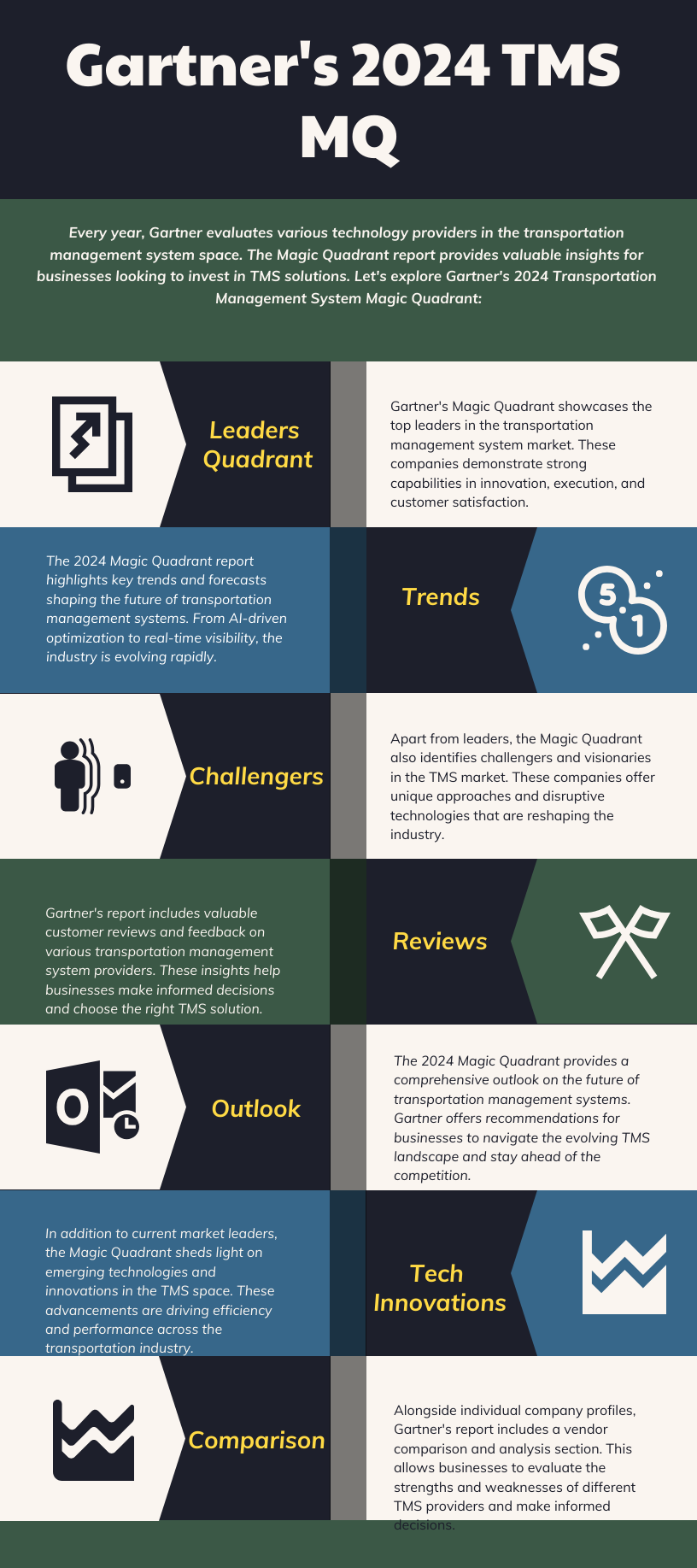
Transportation Management Systems – Gartners Review
The editors at Solutions Review highlight what’s changed in the 2024 iteration of the Gartner Magic Quadrant for Transportation Management Systems (TMS) and analyze the new report.
Gartner recently released the 2024 version of its Gartner Magic Quadrant for Transportation Management Systems. According to Gartner, TMS is a category of systems designed to “manage increasing levels of transportation complexity across multiple transport modes and geographic regions.”
They also help businesses manage supply chains, mitigate risks, address disruptions, and streamline the processes of moving goods through a supply chain.
A TMS software suite’s “must-have” capabilities include strategic freight sourcing, procurement, transportation tracking, shipment visibility, third-party bid management, route determination, carrier selection, execution, analytics, reporting, and settlement features.
Gartner also says that these solutions must be available as standalone or self-service applications independent of other products or services the vendor provides.
What’s Changed: 2024 Gartner Magic Quadrant for Transportation Management Systems
In this Magic Quadrant, Gartner identifies 14 of the marketplace’s most effective Transportation Management Systems (TMS). The researchers behind the report—Brock Johns, Oscar Sanchez Duran, Carly West, and Manav Jain—evaluated the strengths and weaknesses of each provider listed and ranked them on the signature “Magic Quadrant” graph, which illustrates each vendor’s ability to execute its vision. The diagram includes four quadrants: leaders, challengers, niche players, and visionaries.
As the TMS market evolves, Gartner adjusts its criteria to evaluate providers, which means the vendors listed on this year’s report are slightly different from last year.
For example, 3Gtms, 3T Logistics, and RateLinx were not included in the 2024 report, while Blume Global and Shipsy were added. Below is a breakdown of each category and the companies associated with it.
Leaders
Oracle maintains its spot as the headliner of the Leaders category. Its TMS offering, Oracle Fusion Cloud Transportation Management, provides transportation management capabilities alongside support for warehouse management, global trade management, and intelligent technology functionalities.
Oracle’s strengths in the TMS marketplace include the depth of its functionality, market-leading brand name recognition, and its industry-agnostic approach to transportation management, allowing companies across sectors to set themselves up for success with its solution suite.
Blue Yonder also retains its spot on this year’s Gartner report. Its TMS functionalities are included in its broader supply chain execution suite. Those transportation functionalities cover labor management, logistics networks, modeling, and warehouse management.
The company’s differentiating strengths in the marketplace include an in-depth market understanding, a collection of implementation services, robust marketing execution strategies, a growing suite of transportation management capabilities, and its support of multiple industry use cases.
SAP Transportation Management Systems

SAP’s solution, SAP Transportation Management (SAP TM), provides organizations with transportation management via capabilities like freight procurement, transportation planning, execution, and settlement. It works with global companies across industries, emphasizing the consumer products, retail, automotive, and chemical markets.
Its strengths as a TMS vendor are its global reach, evolving sales strategies, global partner ecosystem, and commitment to supply chain products. The company is also continuing to expand its internal and external integration capabilities.
With its Manhattan Active Transportation Management (TM) platform, Manhattan Associates provides clients with an end-to-end transportation management solution with warehouse, yard, carrier, and labor management features.
Its notable qualities as a TMS vendor include its understanding of market trends, consistent brand narrative, cloud-native microservice product architecture, and continued investment in its product’s capabilities.
e2open closes out the Leader quadrant with an end-to-end transportation management solution. It’s available as part of a larger logistics offering, including vehicle routing, scheduling, global logistics orchestration, and advanced logistics visibility functionalities.
It differentiates itself in the TMS market because of its international sales presence, extensive network of implementation partners, and a customer base that spans almost every relevant industry.
Challengers
Alpega Group’s TMS focuses on transportation operations and includes scalable solutions. It works with global organizations, but most clients are based in Europe and operate in the automotive, retail, manufacturing, and consumer goods markets.
Gartner spotlights its market responsiveness, customer retention rate, continued sales momentum, approach to bundled solution offerings, and focus on environmental, social, and governance (ESG) initiatives as differentiating characteristics.
MercuryGate is the next Challenger in Gartner’s report. With its MercuryGate TMS, companies have access to a holistic transportation management solution outfitted with domestic and international transportation operations capabilities.
Most of its innovation roadmap focuses on enhancing the customer experience, and the company is committed to integrating customer requirements and feedback into its development strategies. Other notable features include its rapid customer growth rates, strategic utilization of resellers, and customer-centric business model.
Transportation Management Systems’ TMC
TMC is a division of C.H. Robinson and offers the Navisphere TMS product. Alongside that end-to-end transportation management platform, TMC also offers Navisphere Vision, a real-time transportation visibility solution that can be used standalone or with Navisphere TMS.
The vendor retains its place on the report thanks to its continued investment in its product roadmap, a track record of delivering on business outcome-based objectives, and its emphasis on improving the Navisphere TMS user experience.
Uber Freight is once again a Challenger in Gartner’s Magic Quadrant. Its TMS is designed to provide shippers with self-service transportation management technology alongside a fully managed transportation offering.
The company has a strong record for customer support and has an above-average customer retention rate for the last two years compared to other vendors Gartner covered in their report. Other notable strengths include its real-time transportation visibility capability, consistent customer gross, and investment in new features.
Shipwell is the final Challenger in this year’s report. The company’s TMS supports all of the critical capabilities Gartner says a TMS should have, alongside additional tools like load optimizations, analytics, transportation RFP, and real-time visibility via an integrated carrier network.
It’s also investing in new generative AI and cross-platform automation features. Shipwell’s strengths as a TMS vendor include a top-rated customer experience, commitment to the continued development of its TMS solution, impressive investment in R&D, and strong customer growth rate.
Niche Players
BlueRock TMS is a Niche Player in the TMS market, according to Gartner’s report. Its TMS solution provides capabilities across freight sourcing, procurement, order management, shipment execution, operations planning, and freight settlement use cases, although its primary focus remains on transportation management. The company also offers logistics consulting services.
BlueRock TMS has made a name for itself by maintaining one of the highest customer retention rates of any TMS vendor on the market, and its customer growth rate continues to grow.
Blume Global is one of the new additions to the Magic Quadrant. The company—acquired by WiseTech Global in early 2023—offers a TMS solution that focuses on providing shippers with a global transportation management platform.
Its capabilities cover freight auditing, payments, transportation visibility, and supply chain orchestration. Strengths include its above-average customer retention rate, proven track record of adapting to market demands, a robust product roadmap for 2024, and multimodal features.
Shipsy is the other newcomer on this year’s Magic Quadrant. Its TMS broadly supports domestic and international transportation movements with planning, procurement, and execution capabilities.
Despite being a relatively newer offering, Shipsy has made a name for itself. It has prioritized R&D, its initiatives for leveraging GenAI technologies, strong year-over-year revenue growth (including a recent Series B funding round of over $25 million), and a customer-centric culture that involves users in their product roadmap design.
Visionaries
One Network Enterprises is once again the single Visionary in Gartner’s report. The company provides a TMS focused on end-to-end transportation management, which is part of its broader logistics and supply chain capabilities suite.
Its defining qualities are its investment in R&D—it invests a higher-than-average percentage of revenue into its development efforts—and its commitment to the user experience.
One Network Enterprises plans to expand its solution with predictive and prescriptive solutions based on risk events, enhanced carbon tracking, Rule 11 support, electronic data interchange integration expansion, and transportation forecast planning.
Subscribe to Shift Gear X for more insights on maximizing your B2B outreach strategy. Additionally, leave a review for Shift Gear to receive expert consulting advice.
You might be interested in this – ERP System Examples in today’s world: From Data to Success – Shift Gear X – Build Your Future Net Worth Now
You will also love: Data Analytics in 2024: The Power of Artificial Intelligence – Tech News Before It’s News | Shift GearX









